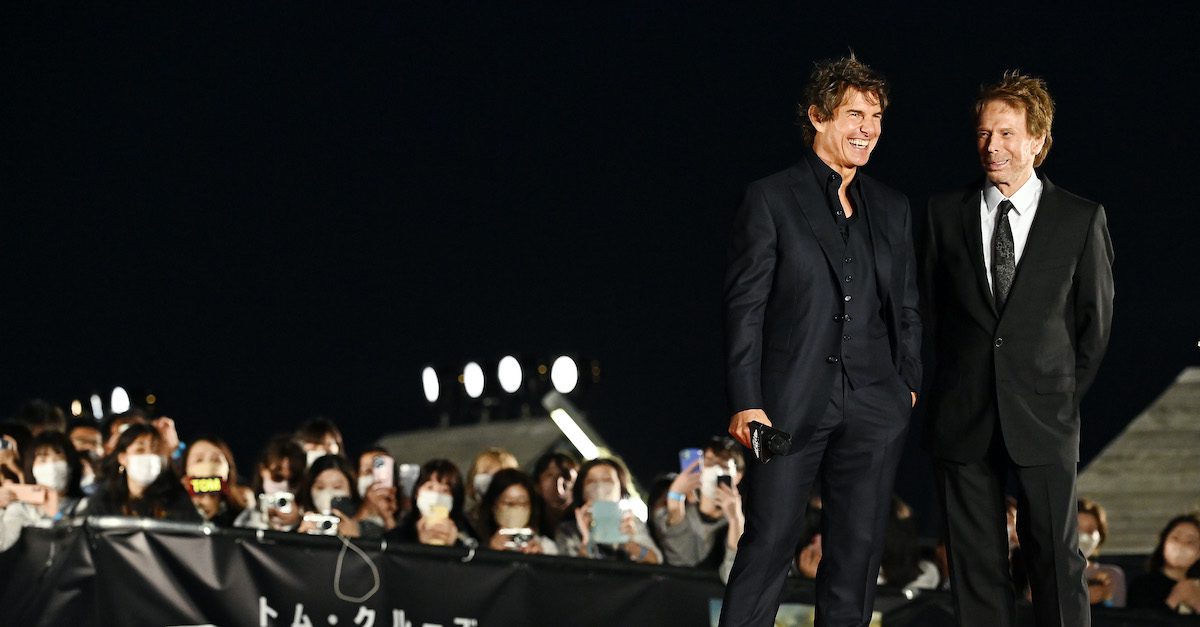

YOKOHAMA, JAPAN – MAY 24: Actor Tom Cruise and producer Jerry Bruckheimer attend the red carpet for the Japan Premiere of “Top Gun: Maverick” at Osanbashi Yokohama on May 24, 2022 in Yokohama, Kanagawa, Japan.
A federal judge in Los Angeles supported Paramount Pictures Friday and dismissed a copyright lawsuit filed by the widow and son of the author of the 1983 magazine article that inspired the hit movie “Top Gun.” The judge ruled that despite some underlying similarities, Paramount’s 2022 sequel “Top Gun: Maverick” did not infringe on any copyrights attached to the article.
Author Ehud Yonay wrote a piece titled “Top Guns” in California Magazine on April 21, 1983, which told the story of Yogi, an F-14 pilot, and Possum, his radio intercept officer, at the Navy’s elite Fighter Weapons School (known as “Top Gun”). Less than one month later, Yonay signed an assignment of motion picture rights to the article to Paramount Pictures Corporation. Three years later, the blockbuster Jerry Bruckheimer film “Top Gun” helped launch Tom Cruise’s career and become a massive box office success. Yonay died in 2012.
In late May 2022, Paramount Pictures released the much-anticipated sequel “Top Gun: Maverick,” which earned an Oscar nomination for Best Picture and grossed a staggering $1.496 billion worldwide. Weeks later, Yona’s widow and son, Shosh and Yuval Yonay, sued Paramount for copyright infringement. They claimed that two years earlier, their copyright agreement with Paramount was terminated and that the company consciously failed to secure a new license of film rights for Yonay’s original story.
The plaintiffs said “Top Gun: Maverick” was a “derivative work” of the 1983 magazine article and thus illegally infringed on their rights. In their lawsuit, they argued that the movie sequel and the article were “substantially similar” in terms of plot, events, pacing, themes, characters, and dialogue.
U.S. District Judge Perry Anderson disagreed. Anderson ruled that the 2022 blockbuster movie was not similar enough to Yonay’s original nonfiction article, and that any underlying similarities are about facts not entitled to copyright protection.
Anderson explained that the article described two real-life F-14 fighter pilots who were shot down easily by their Top Gun instructor in their first aerial combat training exercise and discussed a bar where Top Gun pilots went for drinks and entertainment. It provided descriptions of F-14 flight maneuvers, the intense nature of flight training, the history and development of the school, and the “hotshot” pilots that attended and taught there. The article concluded with the graduation of Yogi and Possum as their squadron flies out to a naval aircraft carrier for their next mission.
By contrast, Anderson said, “Top Gun: Maverick” reprised Cruise’s character of Pete “Maverick” Mitchell, now a test pilot in his mid-50s. Maverick is ordered back to the Naval Air Station North Island to train a group of Top Gun graduates for a dangerous mission to destroy a uranium enrichment plant in enemy territory, and his team includes the son of Maverick’s former radar intercept officer, “Goose,” who died in the original film.
Anderson stated that even though the article and the sequel film both involve Top Gun graduates and instructors, those aspects are not protected by copyright because Top Gun is an actual fighter pilot school. He also mentioned that general plot concepts like training and missions, as well as scenes like fighter pilots landing on an aircraft carrier, getting shot down while flying, or socializing at a bar, are also not considered copyright infringement.
The judge determined that the pacing and events in the article and the sequel were “not similar” in various ways, one of which was that the sequel was set four decades after the article.
“In summary, an unbiased comparison of the respective plots, sequences of events, pacing, themes, atmosphere, conversations, characters, and locations demonstrates that they are not significantly alike,” Anderson wrote. “Even though the article and sequel share certain similarities, those similarities stem from elements that are not protected.”
The attorneys for the involved parties did not promptly respond to a request for comment on the ruling.
The legal dispute over the original story's copyright is not the sole lawsuit that Paramount is confronting regarding its sequel. Barry Tubb, the actor who portrayed Lieutenant Junior Grade Henry “Wolfman” Ruth in the first film, filed a lawsuit against Paramount in February for using his likeness in important scenes without his consent and without compensating him. sued In February, Tubb filed a lawsuit against Paramount for featuring his image in crucial scenes without his permission and without providing compensation.
Tubb’s complaint is based on a scene in the 2022 movie where pilots are discussing a photo of a group of characters from the film, including Wolfman. Tubb argued that the use of his image for commercial purposes resulted in financial gain for Paramount. This case is still ongoing in federal court in California.

